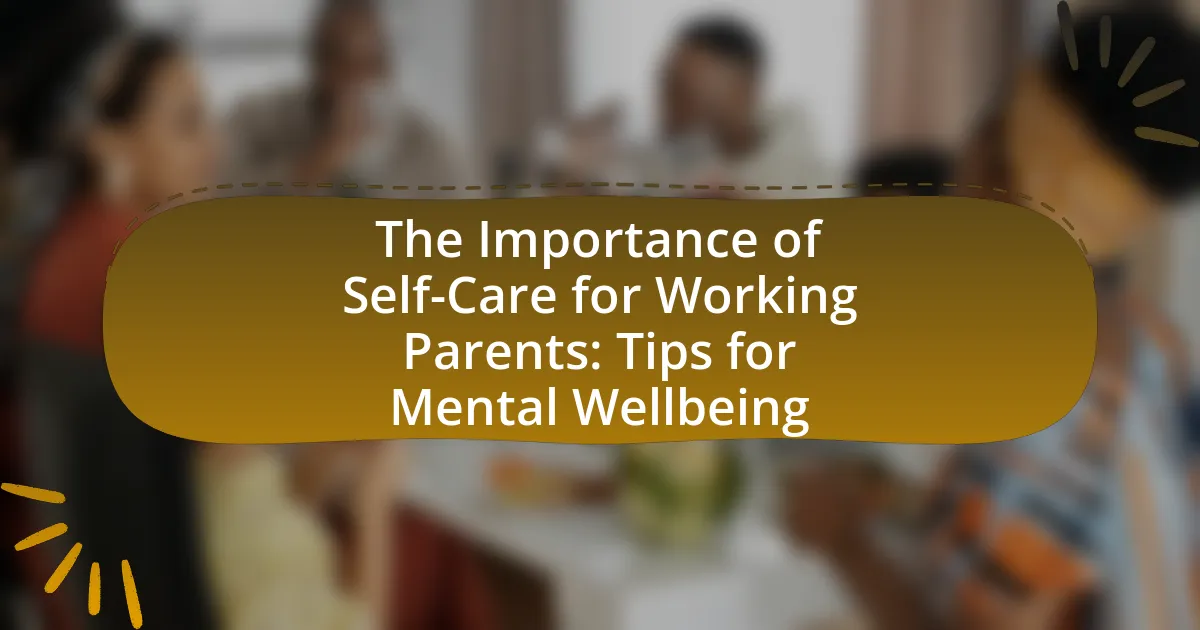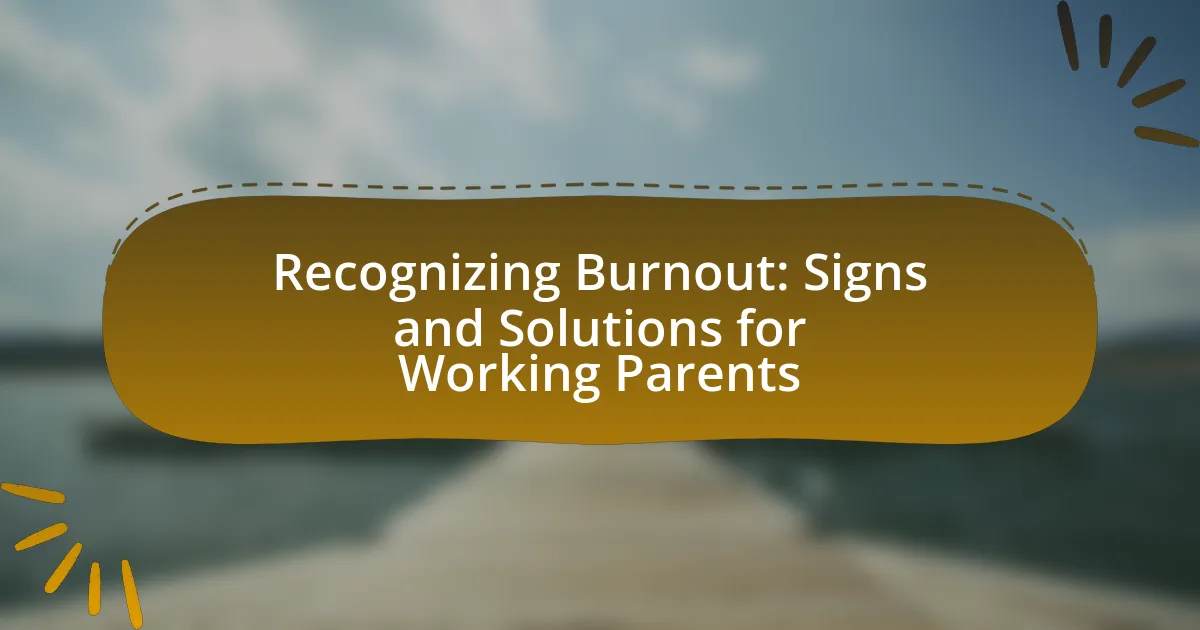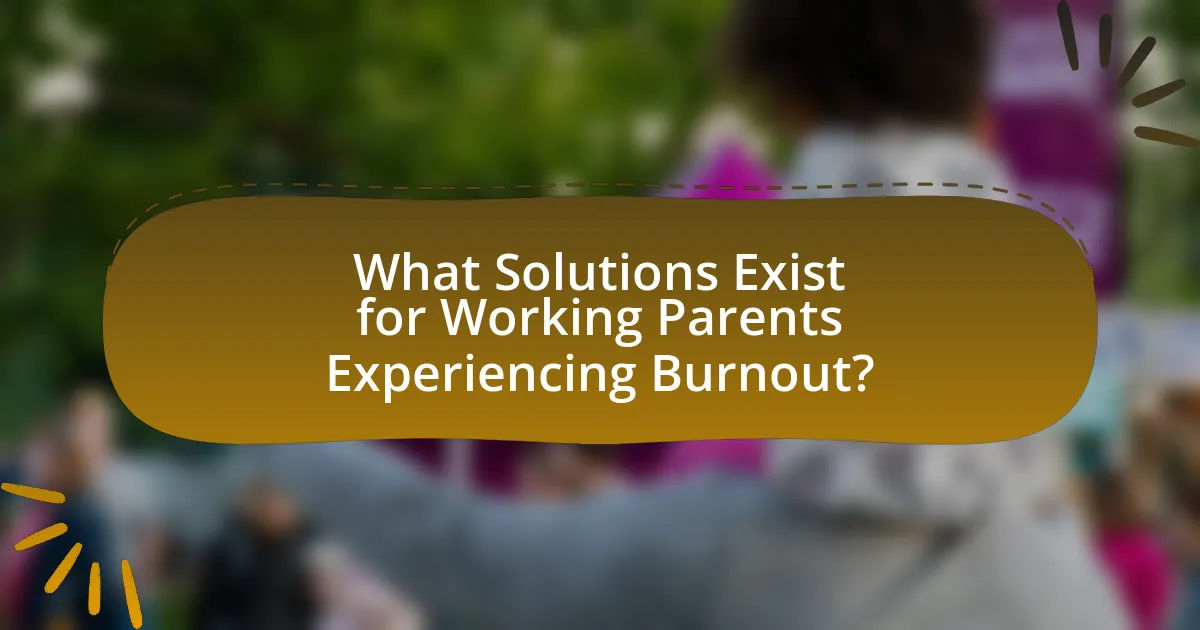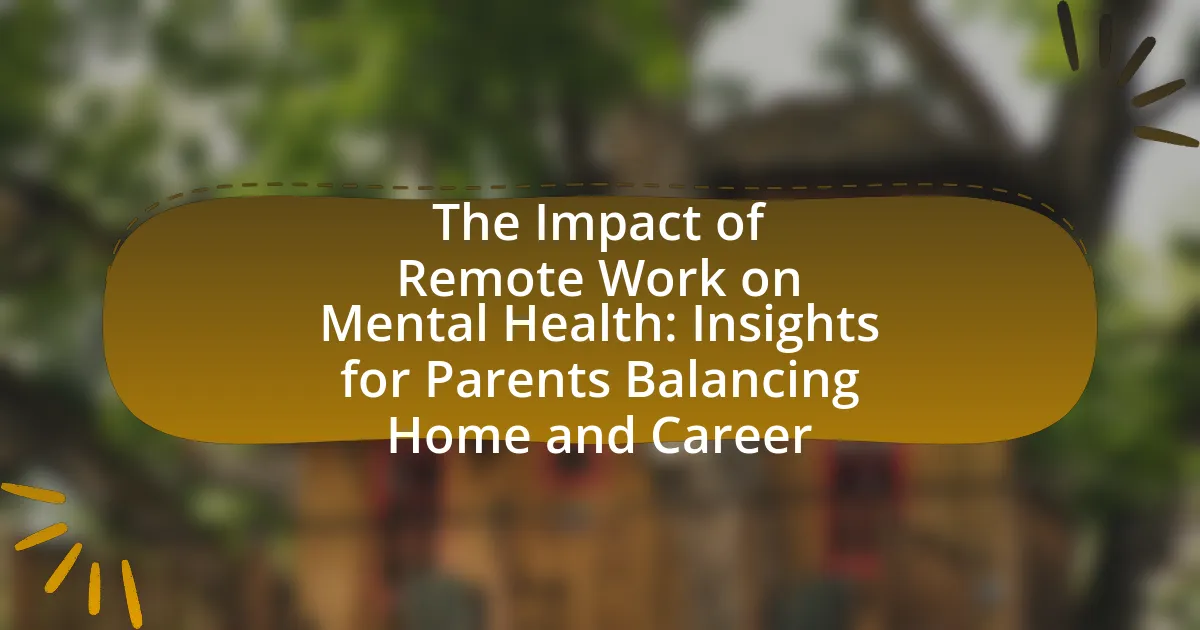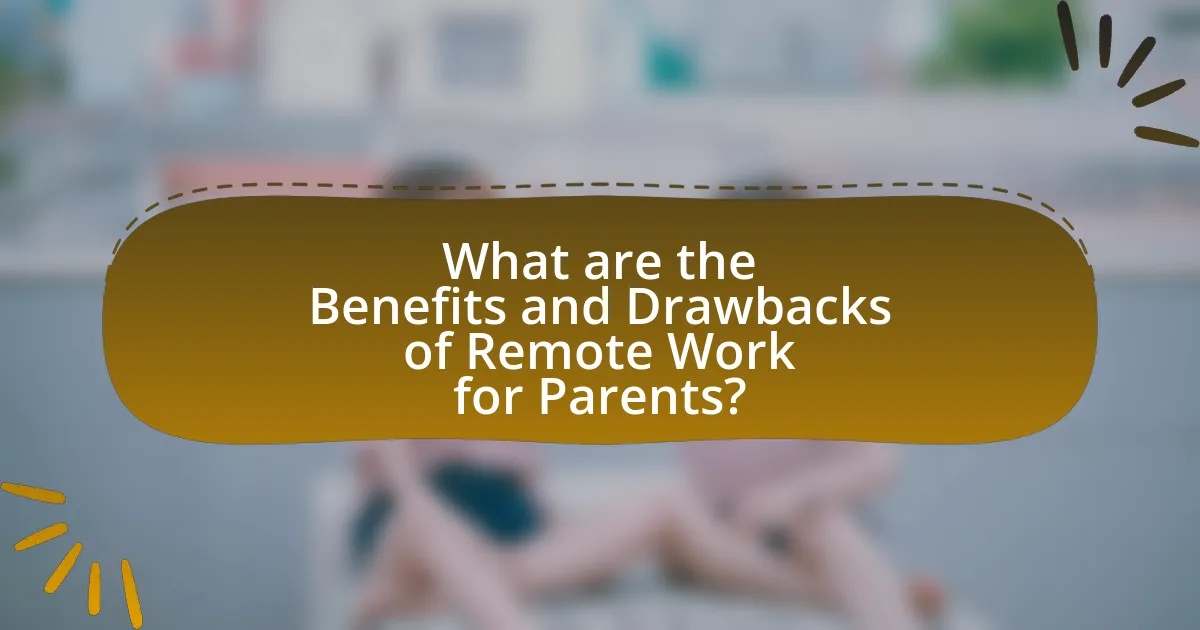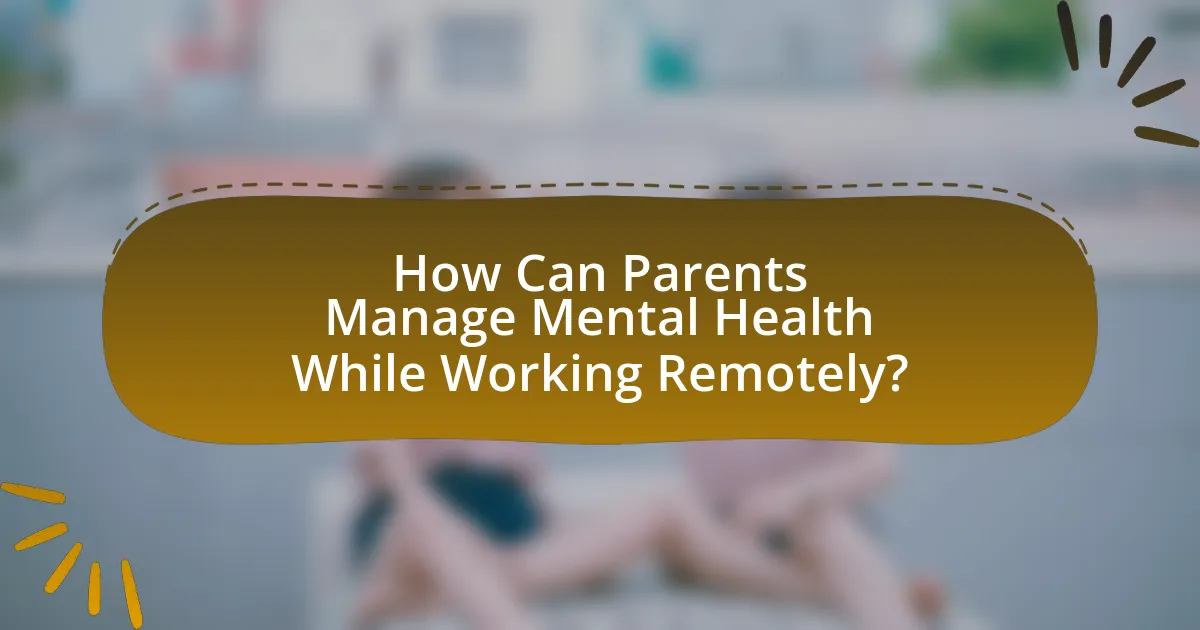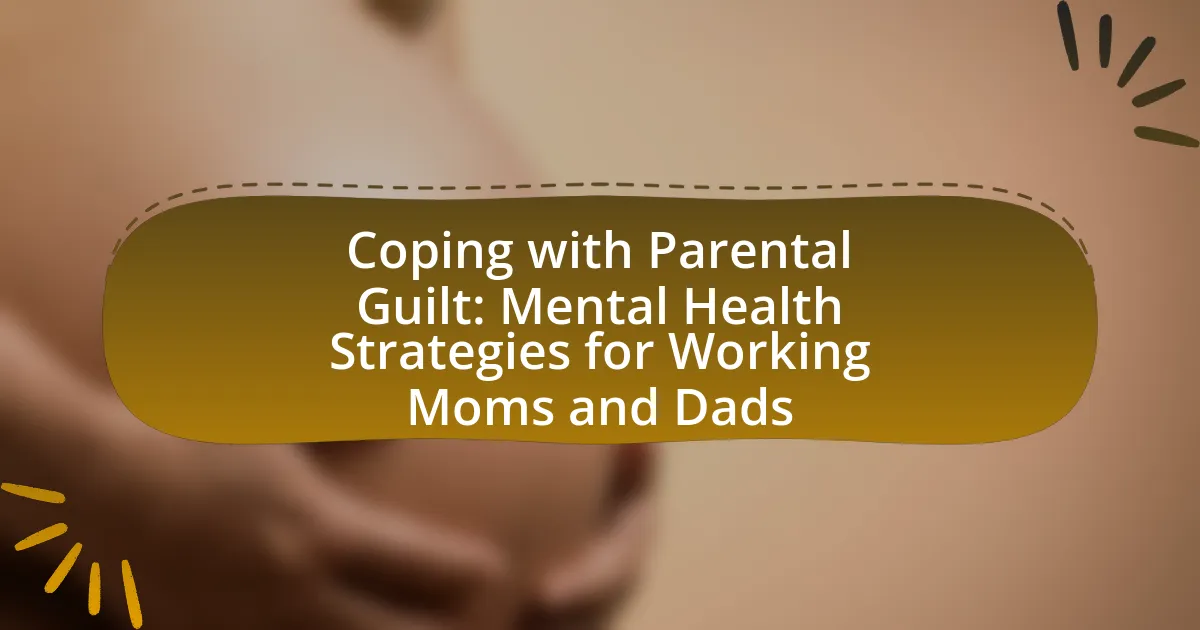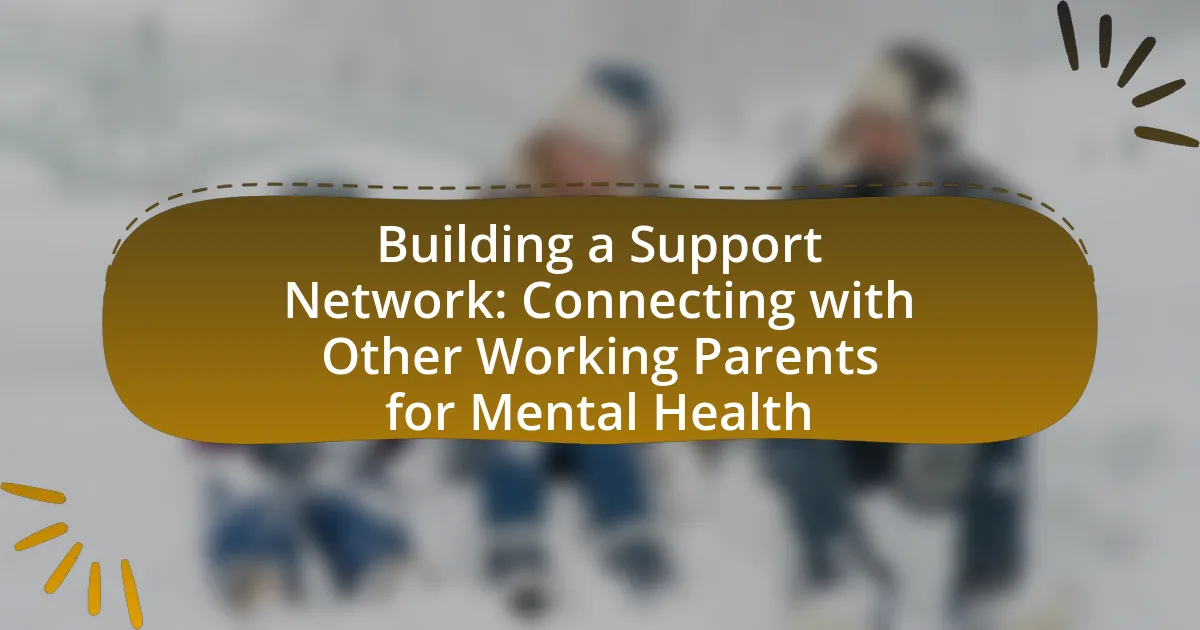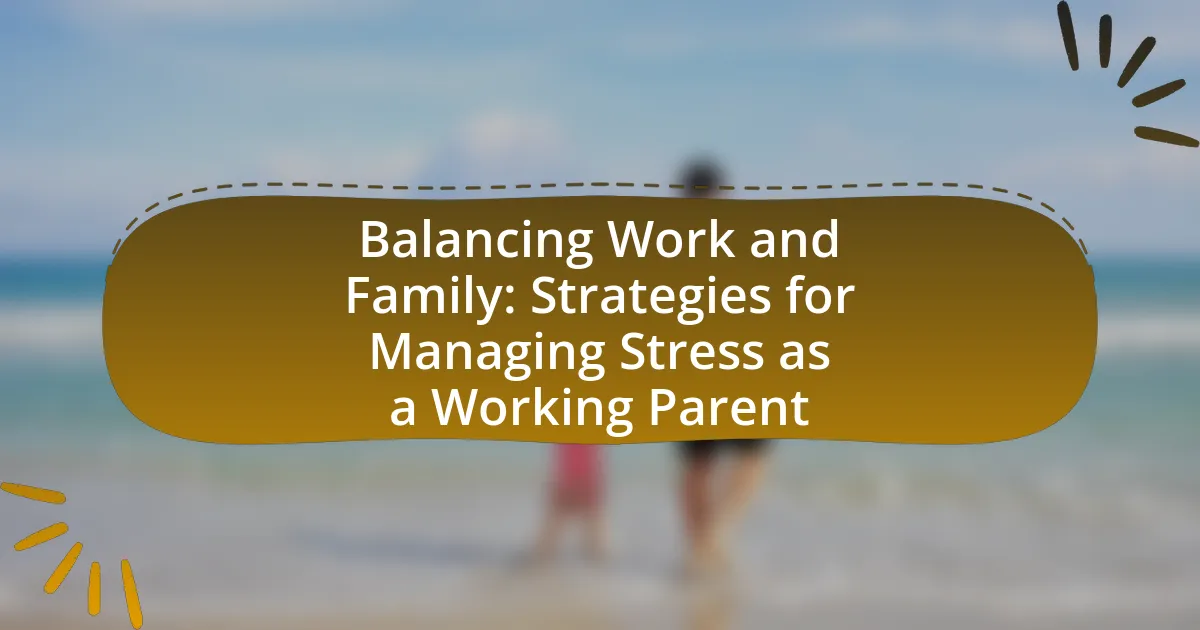The article focuses on the significance of self-care for working parents, emphasizing its role in enhancing mental and physical well-being. It outlines the unique challenges faced by working parents, such as balancing work and family obligations, which often lead to increased stress and mental health issues. The article discusses how self-care practices, including exercise, mindfulness, and setting boundaries, can mitigate these challenges and improve overall family dynamics. Additionally, it highlights various self-care strategies and resources available to support working parents in prioritizing their mental health and fostering a positive environment for their children.
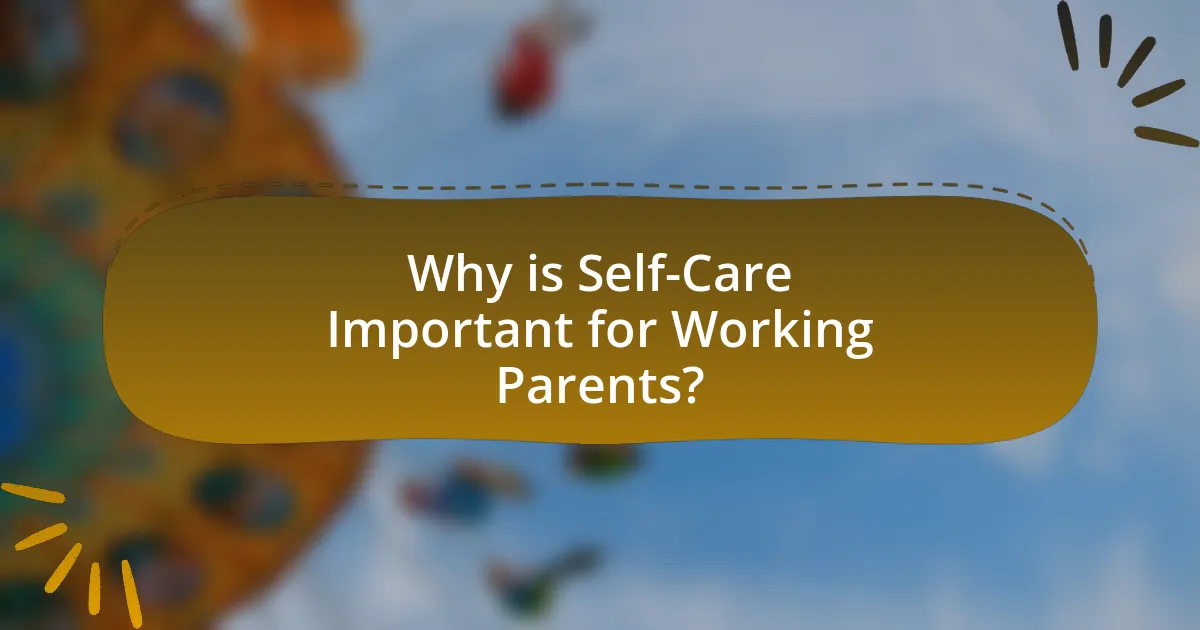
Why is Self-Care Important for Working Parents?
Self-care is important for working parents because it enhances their mental and physical well-being, enabling them to manage stress and fulfill their responsibilities effectively. Research indicates that parents who engage in self-care practices report lower levels of stress and higher levels of life satisfaction. For instance, a study published in the Journal of Family Psychology found that self-care activities, such as exercise and mindfulness, significantly reduce parental burnout and improve overall family dynamics. By prioritizing self-care, working parents can maintain their health, improve their emotional resilience, and create a more positive environment for their children.
What are the unique challenges faced by working parents?
Working parents face unique challenges such as balancing work responsibilities with family obligations, which often leads to stress and time constraints. According to a survey by the Pew Research Center, 56% of working parents report feeling overwhelmed by their dual roles, indicating a significant impact on their mental wellbeing. Additionally, the lack of flexible work arrangements can exacerbate these challenges, making it difficult for parents to attend to their children’s needs while fulfilling job requirements. This struggle for balance can result in increased anxiety and decreased job satisfaction, highlighting the importance of self-care strategies to support their mental health.
How do these challenges impact mental wellbeing?
Challenges faced by working parents significantly impact mental wellbeing by increasing stress levels and leading to feelings of overwhelm. Research indicates that high levels of stress can result in anxiety and depression, with studies showing that 40% of working parents report feeling stressed due to balancing work and family responsibilities. This stress can manifest in physical symptoms, such as fatigue and sleep disturbances, further exacerbating mental health issues. Additionally, the lack of time for self-care activities can diminish coping mechanisms, making it harder for parents to manage their mental health effectively.
What role does self-care play in addressing these challenges?
Self-care plays a crucial role in addressing the challenges faced by working parents by enhancing their mental wellbeing and resilience. Engaging in self-care activities, such as regular exercise, mindfulness practices, and adequate rest, has been shown to reduce stress levels and improve emotional regulation. Research indicates that parents who prioritize self-care report lower levels of anxiety and depression, which are common challenges in balancing work and family responsibilities. For instance, a study published in the Journal of Family Psychology found that self-care practices significantly correlated with improved parenting satisfaction and reduced burnout among working parents. Thus, self-care is essential for maintaining mental health and effectively managing the demands of parenting and work.
How does self-care contribute to overall family health?
Self-care significantly contributes to overall family health by enhancing individual well-being, which in turn fosters a healthier family environment. When parents engage in self-care practices, such as regular exercise, adequate sleep, and stress management, they experience improved mental and physical health. Research indicates that parents who prioritize self-care are more emotionally available and responsive to their children, leading to stronger family relationships and better communication. For instance, a study published in the Journal of Family Psychology found that parental well-being directly correlates with children’s emotional and behavioral outcomes, demonstrating that self-care not only benefits the individual but also positively impacts the entire family unit.
What are the benefits of self-care for parents and children?
Self-care provides significant benefits for both parents and children, enhancing their overall well-being. For parents, engaging in self-care activities reduces stress, improves mental health, and increases emotional resilience, which positively impacts their parenting abilities. Research indicates that parents who practice self-care are more likely to exhibit patience and emotional availability, fostering a nurturing environment for their children.
For children, the benefits of self-care manifest through improved emotional regulation and social skills. When parents prioritize self-care, they model healthy behaviors, teaching children the importance of managing stress and prioritizing their own needs. Studies show that children with parents who engage in self-care are less likely to experience anxiety and depression, leading to better academic performance and social interactions.
In summary, self-care for parents and children promotes emotional health, resilience, and positive family dynamics, supported by research linking parental well-being to child development outcomes.
How can self-care practices improve family dynamics?
Self-care practices can significantly improve family dynamics by enhancing individual well-being, which in turn fosters healthier relationships within the family. When parents engage in self-care, they experience reduced stress and increased emotional resilience, leading to more positive interactions with their children and partners. Research indicates that parents who prioritize self-care report higher levels of satisfaction in their family life and are better equipped to handle conflicts, as they model healthy coping strategies for their children. This creates a supportive environment where open communication and emotional support thrive, ultimately strengthening family bonds.
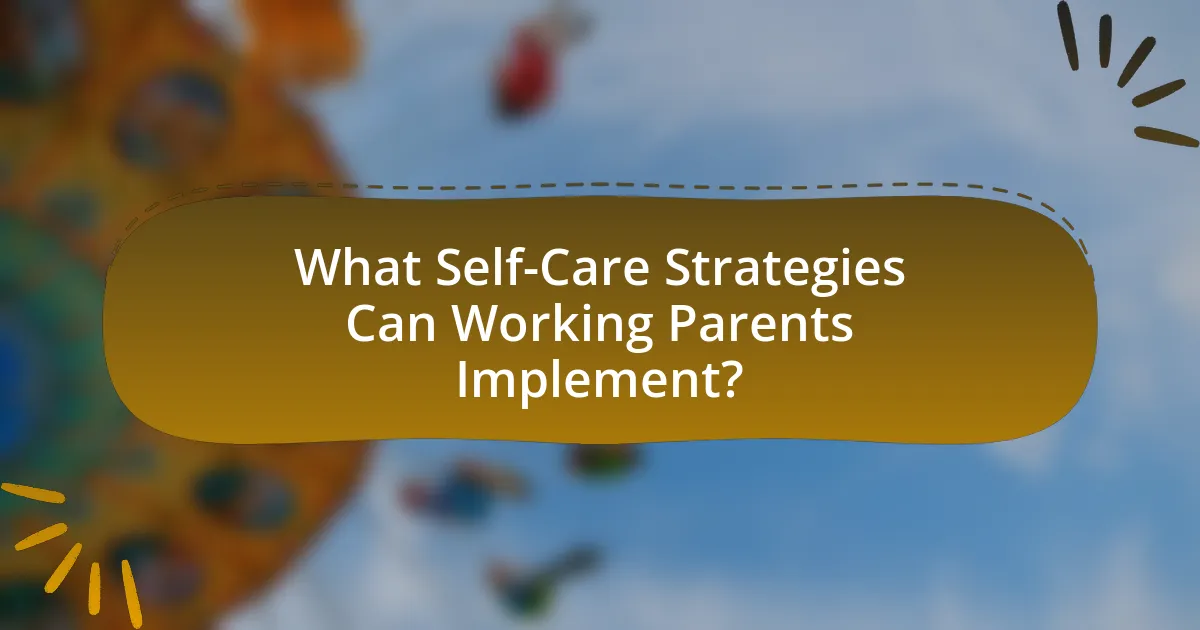
What Self-Care Strategies Can Working Parents Implement?
Working parents can implement self-care strategies such as setting boundaries, prioritizing time for physical activity, and practicing mindfulness. Setting boundaries helps to create a clear distinction between work and personal life, reducing stress and preventing burnout. Engaging in regular physical activity, such as walking or yoga, has been shown to improve mood and overall health, which is crucial for managing the demands of parenting and work. Additionally, practicing mindfulness techniques, like meditation or deep-breathing exercises, can enhance emotional regulation and reduce anxiety, contributing to better mental wellbeing. Research indicates that these strategies can significantly improve mental health outcomes for parents, making them essential for maintaining balance in a busy lifestyle.
What are effective self-care practices for busy parents?
Effective self-care practices for busy parents include prioritizing short, regular breaks, engaging in physical activity, and establishing a support network. Short breaks, even just five to ten minutes, can help parents recharge and reduce stress, as research shows that brief periods of rest can enhance overall productivity and mental clarity. Physical activity, such as a quick walk or home workout, releases endorphins, which improve mood and reduce anxiety. Additionally, having a support network of friends or family members allows parents to share responsibilities and emotional burdens, leading to improved mental wellbeing. Studies indicate that social support is linked to lower levels of stress and better mental health outcomes for parents.
How can parents incorporate mindfulness into their daily routine?
Parents can incorporate mindfulness into their daily routine by setting aside specific times for mindfulness practices, such as meditation or deep breathing exercises. Research indicates that even short, consistent mindfulness practices can significantly reduce stress and improve emotional regulation. For example, a study published in the journal “Psychological Science” found that participants who engaged in mindfulness meditation reported lower levels of anxiety and improved focus. Parents can also integrate mindfulness into everyday activities, such as being fully present during meals or while engaging in conversations with their children, which fosters a deeper connection and enhances overall family wellbeing.
What physical activities can be easily integrated into a busy schedule?
Walking is a physical activity that can be easily integrated into a busy schedule. It requires no special equipment and can be done almost anywhere, making it a convenient option for working parents. Research indicates that even short bouts of walking, such as 10 to 15 minutes, can improve mood and reduce stress, which is crucial for mental wellbeing. Additionally, activities like stretching, bodyweight exercises (such as push-ups or squats), and quick home workouts can also fit into tight schedules, allowing for physical engagement without significant time commitment.
How can parents prioritize self-care amidst their responsibilities?
Parents can prioritize self-care by scheduling dedicated time for themselves, ensuring they engage in activities that promote relaxation and mental well-being. Research indicates that setting aside even 15-30 minutes daily for self-care can significantly reduce stress levels and improve overall mental health. For instance, a study published in the Journal of Family Psychology found that parents who practiced regular self-care reported higher levels of life satisfaction and lower levels of anxiety. By incorporating self-care routines into their daily schedules, parents can better manage their responsibilities while maintaining their mental health.
What time management techniques can help parents find time for self-care?
Effective time management techniques that can help parents find time for self-care include prioritization, scheduling, and delegation. Prioritization allows parents to identify essential tasks and focus on what truly matters, ensuring that self-care is not overlooked. Scheduling involves setting aside specific times for self-care activities, which can be integrated into daily routines, making it a non-negotiable part of their day. Delegation enables parents to share responsibilities with partners or older children, freeing up time for personal well-being. Research indicates that structured time management can significantly reduce stress and improve overall mental health, making these techniques vital for parents seeking balance in their lives.
How can setting boundaries improve self-care efforts?
Setting boundaries can significantly enhance self-care efforts by allowing individuals to prioritize their own needs and reduce stress. When working parents establish clear limits on their time and energy, they create a structured environment that fosters personal well-being. Research indicates that individuals who set boundaries report lower levels of burnout and higher satisfaction in both personal and professional domains. For instance, a study published in the Journal of Occupational Health Psychology found that employees who practiced boundary-setting experienced improved work-life balance and reduced emotional exhaustion. This evidence underscores the effectiveness of boundaries in promoting mental health and overall self-care.

What Resources are Available for Supporting Self-Care in Working Parents?
Resources available for supporting self-care in working parents include employee assistance programs (EAPs), mental health apps, online support groups, and community wellness initiatives. EAPs often provide counseling services and resources tailored to the needs of working parents, helping them manage stress and work-life balance. Mental health apps, such as Headspace and Calm, offer guided meditations and mindfulness exercises specifically designed for busy individuals. Online support groups, like those found on platforms such as Facebook or Reddit, allow parents to connect with others facing similar challenges, fostering a sense of community and shared experience. Additionally, many communities offer wellness initiatives, including workshops and classes focused on stress management and self-care strategies, which can be beneficial for working parents seeking to prioritize their mental wellbeing.
What community resources can assist working parents with self-care?
Community resources that can assist working parents with self-care include local support groups, mental health services, and wellness programs. Support groups, often organized by community centers or non-profits, provide a space for parents to share experiences and coping strategies. Mental health services, available through community health organizations, offer counseling and therapy specifically tailored for parents facing stress and burnout. Additionally, wellness programs, frequently sponsored by local governments or health organizations, may include fitness classes, mindfulness workshops, and family activities that promote relaxation and well-being. These resources are essential for helping working parents prioritize their mental health and self-care.
How can local support groups enhance self-care practices?
Local support groups enhance self-care practices by providing a community of shared experiences and resources that promote mental wellbeing. These groups facilitate emotional support, which has been shown to reduce stress and improve overall mental health. Research indicates that social support can lead to better coping strategies and increased resilience among individuals facing similar challenges, such as those experienced by working parents. For instance, a study published in the Journal of Family Psychology found that parents who participated in support groups reported higher levels of life satisfaction and lower levels of depression. This evidence underscores the effectiveness of local support groups in fostering environments where self-care practices can thrive.
What online resources provide valuable self-care tips for parents?
Online resources that provide valuable self-care tips for parents include websites like Parenting.com, which offers articles on stress management and self-care strategies specifically for parents. Additionally, the American Psychological Association (APA) provides resources focused on mental health and self-care practices tailored for caregivers. The National Parent Helpline also offers support and tips for emotional well-being. These resources are credible and widely recognized for their focus on parental mental health and self-care.
What are some practical tips for implementing self-care as a working parent?
To implement self-care as a working parent, prioritize scheduling dedicated time for personal activities, such as exercise, hobbies, or relaxation. Research indicates that regular physical activity can reduce stress and improve mental health, which is crucial for parents balancing work and family responsibilities. Additionally, establish boundaries between work and home life by setting specific work hours and creating a designated workspace. This separation helps to minimize work-related stress during family time. Furthermore, practice mindfulness techniques, such as meditation or deep breathing exercises, which have been shown to enhance emotional regulation and reduce anxiety. Lastly, seek social support by connecting with other parents or joining support groups, as social interactions can provide emotional relief and practical advice.
How can parents create a personalized self-care plan?
Parents can create a personalized self-care plan by identifying their specific needs and preferences, setting realistic goals, and scheduling regular self-care activities. First, parents should assess their physical, emotional, and mental health needs, which can include activities like exercise, meditation, or hobbies. Next, they should establish achievable goals, such as dedicating 30 minutes a day to a favorite activity or practicing mindfulness three times a week. Finally, incorporating these activities into a weekly schedule ensures consistency and prioritizes self-care, which is essential for maintaining mental wellbeing. Research indicates that regular self-care practices can significantly reduce stress and improve overall health, highlighting the importance of a tailored approach for working parents.
What are some quick self-care activities that can be done daily?
Quick self-care activities that can be done daily include taking short breaks for deep breathing, engaging in five minutes of stretching, and practicing mindfulness through meditation. These activities are effective because they can be completed in a brief amount of time, allowing individuals to recharge mentally and physically. Research indicates that even short mindfulness practices can reduce stress and improve overall well-being, making them beneficial for busy individuals, particularly working parents.
